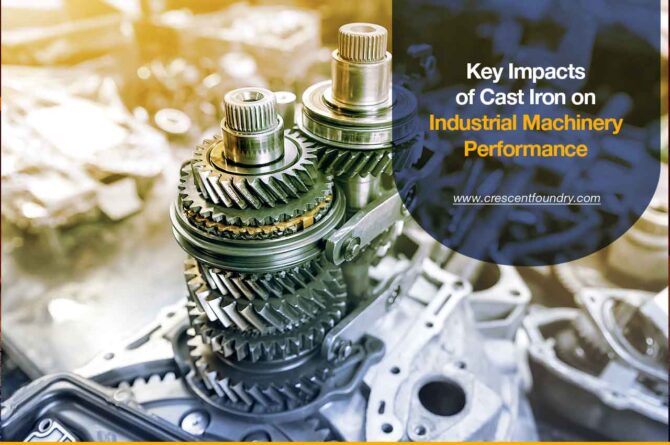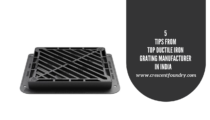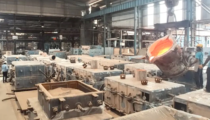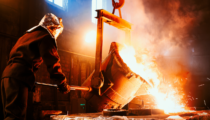In sync with global trends, the Indian market for ductile…

Key Impacts of Cast Iron on Industrial Machinery Performance
In the world of industrial machinery, the material choice can make or break performance, longevity, and efficiency. Among the myriad of materials available, cast iron stands out due to its exceptional properties and versatility. This blog delves into the key impacts of cast iron on industrial machinery performance, exploring its benefits and the role of cast iron manufacturing in enhancing machinery.
What Makes Cast Iron a Preferred Choice?
Cast iron has been a cornerstone of industrial machinery for centuries, and for good reason. Its unique composition and properties lend themselves well to the rigorous demands of industrial applications. Here’s a closer look at the attributes that make cast iron a preferred choice:
Durability and Strength: Cast iron is renowned for its impressive durability and strength. Its high carbon content, typically between 2% and 4%, gives it a hardness that is ideal for heavy-duty applications. This durability is crucial for machinery components that undergo constant stress and strain. The material’s ability to withstand wear and tear ensures that machinery parts have a longer service life, reducing the need for frequent replacements and maintenance.
Machinability: Despite its hardness, cast iron is relatively easy to machine compared to other metals. This machinability allows for precise manufacturing of complex parts and components, which is essential for achieving high performance in industrial machinery. The ability to create intricate shapes and dimensions without compromising structural integrity adds to its versatility and appeal.
Castability: One of the most significant advantages of cast iron is its excellent castability. The material flows easily into moulds, enabling the production of complex shapes and detailed designs. This property is particularly beneficial in the manufacturing of machinery components that require specific geometric configurations for optimal performance. The efficiency of cast iron manufacturing processes ensures that high-quality, precision-engineered parts can be produced with relative ease.
Damping Properties: Cast iron has superior damping properties compared to other materials. This means it can absorb vibrations and reduce noise, which is a crucial factor in machinery performance. By minimising vibrations, cast iron helps in maintaining the stability and accuracy of machinery operations, contributing to smoother and quieter performance.
Thermal Conductivity: The thermal conductivity of cast iron allows it to dissipate heat effectively. In industrial machinery, this is vital for preventing overheating and ensuring that components operate within their optimal temperature range. Effective heat dissipation helps in maintaining the integrity of machinery parts and prevents potential damage from thermal stress.
The Role of Cast Iron Manufacturers in Enhancing Performance
The impact of cast iron on industrial machinery performance is not only a result of its inherent properties but also of the quality of its manufacturing. Cast iron manufacturers play a pivotal role in determining the effectiveness of cast iron components. Here’s how they contribute to enhancing machinery performance:
Precision Engineering: Skilled cast iron manufacturers utilise advanced techniques and technology to produce high-precision components. By leveraging modern casting methods such as sand casting, investment casting, and shell moulding, manufacturers can achieve tight tolerances and high-quality finishes. Precision engineering ensures that machinery parts fit perfectly and function optimally, which is essential for the overall performance of industrial machinery.
Material Selection and Quality Control: The quality of cast iron depends significantly on the raw materials used and the manufacturing process. Reputable cast iron manufacturers focus on selecting high-quality raw materials and maintaining stringent quality control throughout the production process. This attention to detail ensures that the cast iron produced meets industry standards and performs reliably under demanding conditions.
Innovation in Casting Techniques: Continuous innovation in casting techniques allows manufacturers to improve the performance characteristics of cast iron. Advances in alloy formulations, casting methods, and post-casting treatments can enhance properties such as strength, wear resistance, and machinability. Manufacturers who invest in research and development can offer cast iron products with enhanced performance attributes tailored to specific industrial applications.
Customisation and Design Expertise: Cast iron manufacturers often work closely with clients to provide customised solutions that meet specific machinery requirements. Their expertise in designing and producing cast iron components enables them to address unique performance challenges and deliver tailored solutions. This customisation can lead to improved efficiency, reliability, and overall performance of industrial machinery.
Conclusion:
Cast iron continues to be a material of choice in industrial machinery due to its outstanding properties, including durability, machinability, and damping capabilities. The role of cast iron manufacturing in optimising machinery performance cannot be overstated. With manufacturers like Crescent Foundry leading the way in innovation and quality, the benefits of cast iron are leveraged to their fullest potential, ensuring that industrial machinery performs reliably and efficiently. Whether through enhanced strength, superior damping, or effective heat dissipation, cast iron remains a fundamental element in the advancement of industrial machinery.





